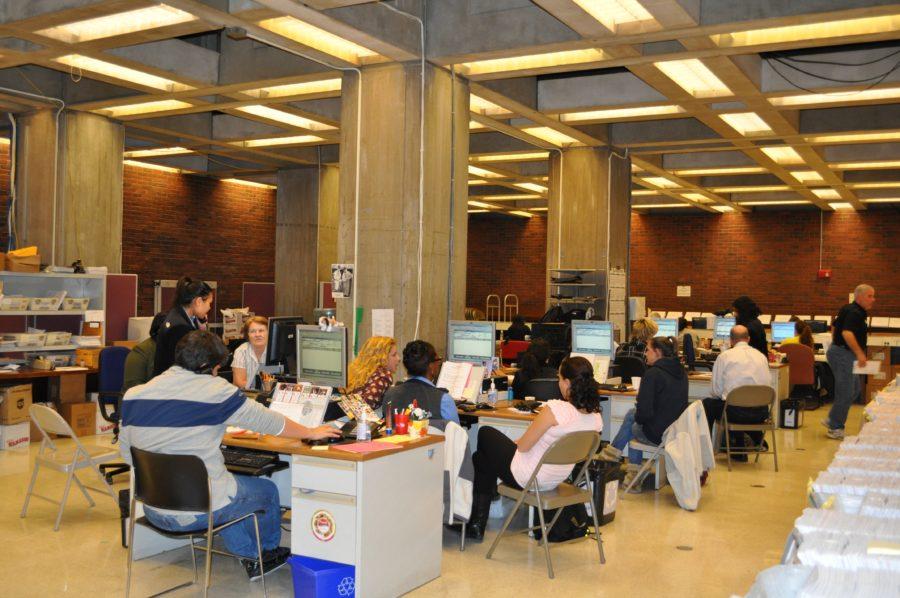Derek Anderson
Journal Staff
“Young people make the difference in every critical election and then most of the critical issues,” said Senator John Kerry in an interview with the Journal. “If you go back historically where there is the environment movement, or against war, or women’s rights, other things, it’s been young people who have been able to really sound the alarm bells and energize people.”
And that’s exactly what occurred yesterday in Boston during Election Day. More than 100 Suffolk students aided the election process throughout the city. From polling places scattered across the area to the Boston City Hall Election Department, students worked from as early as 6 a.m. to as late as 10 p.m. With a multitude of positions available, students were able to positively affect the campaign through a wide array of opportunities.
“We have them in multiple positions,” said Professor Rachael Cobb, chair of the government department and head of the University Poll Workers Project. “We have a group of students who are poll workers, we have a group who are accessibility ambassadors who assist voters with disabilities, and we also have a group of students working as poll observers.”
Elections in 2006, 2008 and the most recent election have all been aided by the University Poll Workers Project.
“We have a grant from the United States Election Assistance Commission. The project is a project for students to work as poll workers. What we do specifically is we work in collaboration with the city of Boston,” said Cobb. “In addition, we are also working with Wheaton College and the city of Brookline, to recruit students to be poll workers. Poll workers are election officers on the day of election. They are the people responsible for putting up all the signage at polling locations, handling the ballots and counting them at the end of the day.”
Overall, Suffolk students consisted of 123 poll workers, 19 assistance ambassadors, 53 poll observers, 11 peer recruiters and eight faculty members who have offered to give credit to those involved. Each of these positions plays a vital part in the election process.
“Our ambassadors are there to make every voter aware of this technology, but specifically to provide assistance to any voters who ap pear to need any extra help,” said Cobb. She also explained the role of the poll observer. “They go into polling locations and sit and observe the polling process. They collect standard data about the interaction between poll worker and voter. They are also not paid. They are working much shorter shifts, but it is an opportunity to observe the voting process and collect data in a systematic way.”
Students and city workers answered phone calls and offered assistance in City Hall. Geraldine Cuddyer, chair of the board of election commissioners for the Boston Election Department shared with the Journal her excitement regarding Suffolk’s student involvement.
“We’ve been working with Professor Cobb, from Suffolk, since 2006, and that’s when we started with the University Poll Workers Project and have continued to work together on various aspects of elections going on,” said Cuddyer. “This year, not only do we have accessibility ambassadors, but also the throngs of Suffolk students that are here answering phones in the Election Department.”
Operations at the Election Department had phones constantly ringing and workers bustling. Cuddyer explained that most people called to find out where they vote and their voting status. There is a status called “inactive” which scares people, and it is mistaken as not being able to vote at all. In truth, it actually means an individual has probably moved and the state doesn’t know where the person went. Ninty-nine percent of the time they can still vote and the phones let people know that. Cuddyer also explained they get calls from polling locations complaining about campaigners. “People in Boston: We campaign like we drive. Very aggressively.”
Peter Oundjian, a member of the 2014 class, was one of the multiple students working in the Election Department. “I’m here working on the election telephone booths. I’ve been answering phone calls from voters who want more information on how to vote and where to get registration cards.” Oundjian, who speaks both Arabic and Armenian, was originally stationed at the translation desk. “I was working on the translation table, but there were no Armenian or Arabic speakers, so I’ve been working on the phones.”
Joe Paru, president of the Suffolk GOP, was also working in the Election Department answering phones. “It’s very busy. It’s such a big election. Lots of people are not registered and think they’re entitled to vote, or just simply don’t know where they’re supposed to vote. That’s how it’s been all day.”
Among all of the student involvement, whether it was at the polling locations or City Hall, Professor Cobb had a goal with two lessons. “The goal is two-fold. On one hand, the goal is to engage students and excite them. On the other, it’s there to educate them about how complicated it is to run an election and that democracy is not an easy thing to administer. There are a lot of rules involved. Elections are a lot of moving parts that all need to coordinate on one day.”
In the end, Cobb was happy with the involvement and looked forward to the next election. “The excitement from students never ceases to die down. They are an eager group of people and they are absolutely wonderful; very committed to the elections, very excited to be helping and extremely dedicated. So I am constantly impressed by the caliber of students that are attracted to this.”








